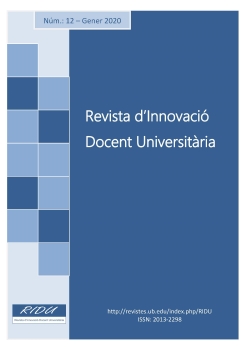Adapting learning to companies’ requirements: a project based learning activity
DOI:
https://doi.org/10.1344/RIDU2020.12.6Keywords:
Project-based learning, Active learning, Skills, University teachingAbstract
There are numerous studies that call for a greater adaptation of the learning to the skills required by the labour market. These skills, which must be developed during the years of schooling, include both technical (i.e., knowledge) and soft skills (e.g., for example, creativity, critical spirit, or teamwork). In response to this companies’ requirement, an increasing number of universities are opting for the intensive use of active learning methodologies, which have been shown to help promote these skills among students. This study is settled in this context. Specifically, we present a project-based learning experience conducted with students of the Master's Degree in Business Management and Production Systems of the Universitat Internacional de Catalunya (Barcelona, Spain). The ultimate purpose of this activity was to help students develop some of the skills that are required in the workplace.References
Bennett, N., Dunne, E., Carre, C. (1999) Patterns of core and generic skills provision in higher education. Higher Education, 37, pp. 71–93.
Berbegal-Mirabent, J., Gil-Doménech, D. (2019) Equipping students with work-based skills: Experiences from a teaching innovation project. XXVIII Jornadas de la Asociación de Economía de la Educación (AEDE). Las Palmas de Gran Canaria, 27-28 junio.
Berbegal-Mirabent, J., Gil-Doménech, D., Alegre, I. (2017) Where to Locate? A Project-Based Learning Activity for a Graduate-Level Course on Operations Management. International Journal of Engineering Education, 33(5), pp. 1586–1597.
Blank, W. (1997) Authentic instruction. En: W.E. Blank, S. Harwell (Eds.) Promising practices for connecting high school to the real world (pp. 15-21). Tampa, FL: University of South Florida.
Blumenfeld, P.C., Soloway, E., Marx, R.W., Krajcik, J.S., Guzdial, M., Palincsar, A. (1991) Motivating project-based learning: Sustaining the doing, supporting the learning. Educational Psychologist, 26(3–4), pp. 369-398.
della Volpe, M. (2018) Entrepreneurial university and business education: Towards a network model. International Journal of Business and Management, 13(3), pp. 13-27.
García, D., Iris, Y. (2013) Aprendizaje por proyecto: Incidencia de la tecnología de la información para desarrollar la competitividad de trabajo colaborativo. Ciencia y Sociedad, 38(4), pp. 691-717.
Finkelstein, N., Hanson, T., Huang, C.-W., Hirschman, B., Huang, M. (2010) Effects of problem-based economics on high school economics instruction (NCEE 2010-4110). Washington, DC: U.S. Department of Education, Institute of Education Sciences, National Centre for Education Evaluation and Regional Assistance, Regional Educational Laboratory West.
Friedman, K. (2000) Creating design knowledge: from research into practice. Actas de IDATER Conference, 1, pp. 5-32.
Galeana de la O, L. (2006) Aprendizaje basado en proyectos. Revista Digital Educación a Distancia, 1(27), pp. 0-17.
Harwell, S. (1997) Project-based learning. En: W.E. Blank, S. Harwell (Eds.) Promising practices for connecting high school to the real world (pp. 23-28). Tampa, FL: University of South Florida.
Laffey, J., Tupper, T., Musser, D., Wedman J. (1998) A computer-mediated support system for project-based learning. Educational Technology Research and Development, 46(1), pp. 73-86.
Leckey, J.F., McGuigan M.A. (1997) Right tracks-wrong rails: The development of generic skills in higher education. Research in Higher Education, 38(3), pp. 365-378.
López Gumucio, J.R. (2010) La selección de personal basada en competencias y su relación con la eficacia organizacional. Perspectivas, 26, pp. 129-152.
Macho-Stadler, E., Elejalde-García, M.J. (2013) Case study of a problem-based learning course of physics in a telecommunications engineering degree. European Journal of Engineering Education, 38(4), pp. 408-416.
Maldonado, M. (2008) Aprendizaje Basado en Proyectos aplicado en la asignatura Tecnología de los Materiales. Actas del V Congreso de Docencia Universitaria e Innovación. Lérida, 2-4 julio.
Marx, R.W., Blumenfeld, P.C., Krajcik, J.S., Soloway E. (1997) Enacting project-based science. The Elementary School Journal, 97(4), pp. 341-358.
Santos Guerra, M.A. (2015) Corazones, no solo cabezas en la universidad. Los sentimientos de los estudiantes ante la evaluación. Revista de Docencia Universitaria, 13(2), pp. 125-142.
Thomas, J.W. (2000) A review of research on project-based learning. San Rafael, CA: Autodesk Foundation.
Tippelt, R., Lindemann, H-J. (2001) El Método de Proyectos. El Salvador / Berlin: Ministerio de Educación y proyecto APREMAT, SLV/B7-310/IB/97/248, setiembre 2001. Disponible en: http://www.halinco.de/html/doces/Met-proy APREMAT092001.pdf (último acceso: Diciembre 23, 2019).
Vega, F., Portillo, E., Cano, M., Navarrete, B. (2014) Teaching experiences in chemical engineering: design, manufacturing and start-up of a lab-scale distillation unit using problem-based learning. Formación Universitaria, 7(1), pp. 13-22.
Walker, A., Leary, A. (2009) Problem based learning meta-analysis: Differences across problem types, implementation types, disciplines and assessment levels. The Interdisciplinary Journal of Problem-Based Learning, 3(1), pp. 12-43.
Willard, K., Duffrin, M.W. (2003) Utilizing project‐based learning and competition to develop student skills and interest in producing quality food items. Journal of Food and Science Education, 2(4), pp. 69-73.Downloads
Published
Issue
Section
License
Authors whishing to publish in this journal agree to the following conditions:
- The author or author retain copyright and grants the journal the right of first publication of the paper.
- The texts will be published under license "Reconocimiento Creative Commons 4.0 España", which allows to share, distribute, reproduce and the public communication of the paper, as long as the name of the author or authors and the journal are clearly stated.







